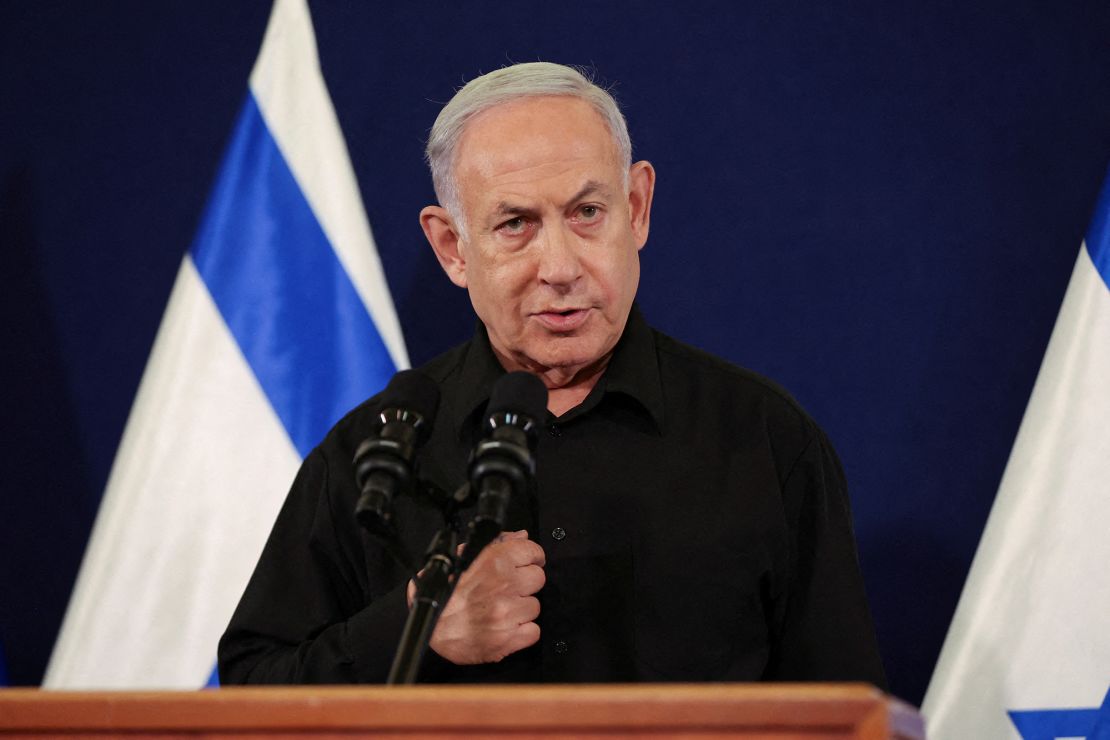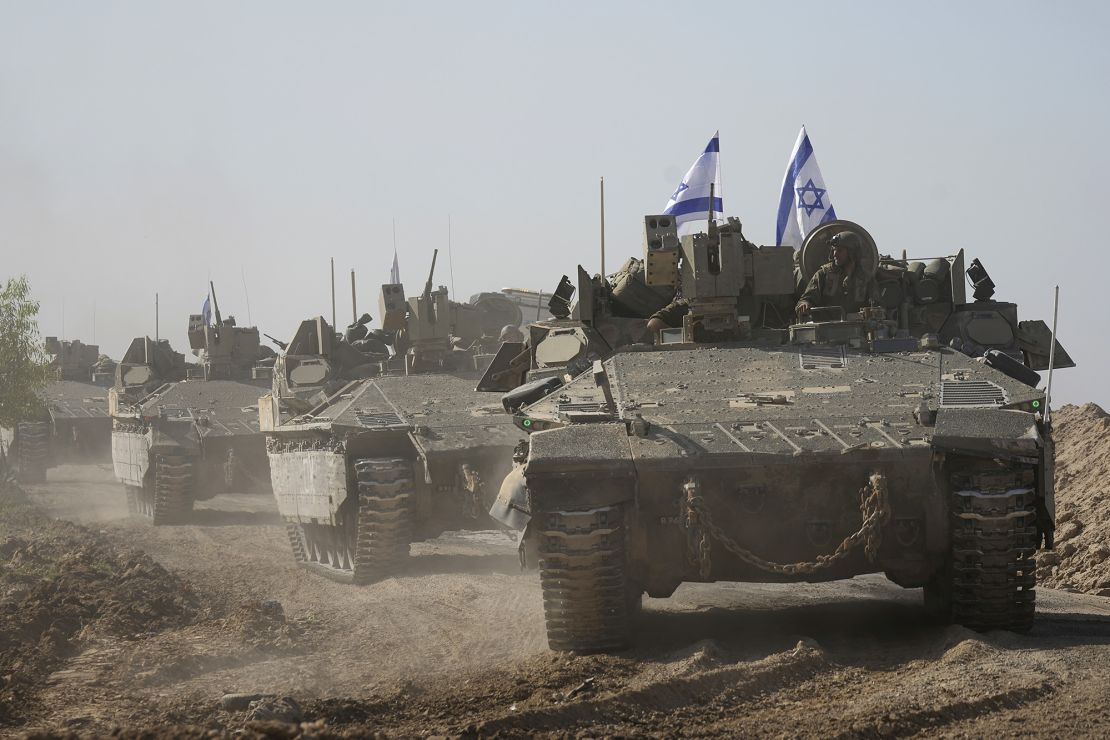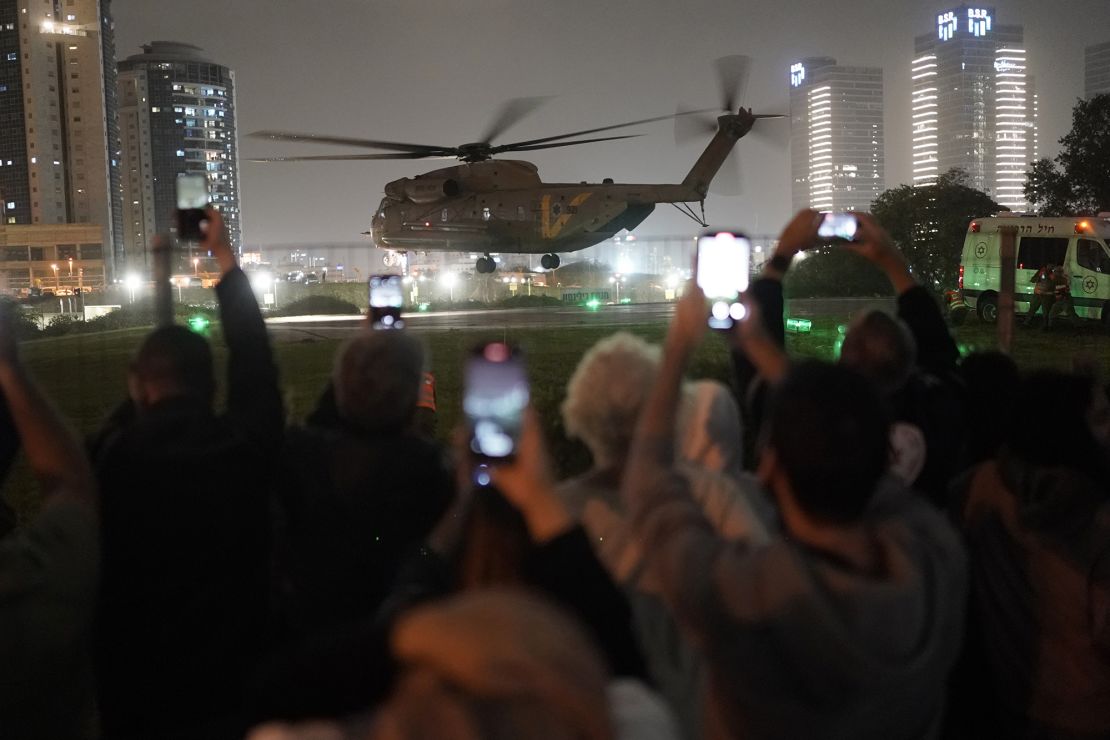Alex Sherman has only been able to sleep a few hours each night since his son Ron was taken away from an army base close to Gaza on October 7 by Hamas militants. Because Ron is a soldier, Sherman worries the?19-year-old?will be among the hardest to negotiate out of Gaza.
The retiree is desperate to be reunited with his son, but thinks fighting will resume before it happens. Hamas’ political leader in Gaza, Yahya Sinwar, “will keep Ron very close to him – my son is like a human shield,” he predicted.? It’s a fear shared by many families of soldiers abducted by Hamas.
Each weekend since the Hamas attacks, Sherman has taken part in a rally in Tel Aviv for the hostage families. This?swelled in size on?Saturday, as Israelis urged their government to work toward the release of all the hostages captured on October 7, and a potential extension of the current pause in fighting.
Under the?truce agreement?between Israel and Hamas,?groups of?Israeli citizens and other nationals?have been?freed from Gaza every day since Friday,?while Israel has released?Palestinian women and children?detainees.
All of the Israelis released under this deal have been?civilian women and children. The fate of?soldiers and?adult?civilian males?remains deeply uncertain?–?they are considered the hardest to negotiate out of Gaza,?a source previously told CNN.
Qatar’s foreign ministry announced Monday that an agreement had been reached to extend the truce in Gaza by an additional two days.
Israel had earlier indicated that it would be open to a daily extension for every 10 new hostages released by Hamas after the?four-day deal ends, with Prime Minister Benjamin Netanyahu?describing the possibility as?“welcome”?when talking Sunday to US President Joe Biden.
Hamas ?had also expressed interest in extending the truce?“through serious efforts to increase the number of those released from imprisonment as stipulated in the humanitarian ceasefire agreement.”
It’s a move which has the support of key nations, including the United States and Qatar, and?would provide further respite for civilians in Gaza who have?endured weeks of Israeli bombardment and a worsening humanitarian crisis.

But the potential release of more hostages?still offers little hope for families?with relatives in the Israeli armed forces, like Sherman’s. Nadav Eyal, a columnist at the Israeli Yediot Ahronoth newspaper, told CNN that Hamas has not “seriously proposed the return of all kidnapped Israelis or any major deal.”
Another potential complication is that Hamas does not itself hold all the Israelis abducted into Gaza.?An estimated?40 to 50 are thought to be held by?Palestinian Islamic Jihad, as well as other groups or individuals.
And despite international calls for a ceasefire that would bring sustained?humanitarian relief to Gaza, the Israeli government has said it is committed to continuing the war?until its goal of eliminating Hamas is achieved.
Eyal said the Israeli public is largely behind the government’s war effort and is united?in a desire?to get as many hostages back as possible before “the second part of the war” begins.
What may come next in the war?
Once the truce is over, Israel is expected to continue its ground?and air operation?– and has already indicated that it could expand its focus to the south of the enclave.?The Israel?Defense Forces (IDF)?dropped?leaflets?on parts of?southern Gaza in mid-November, warning communities east of Khan Younis?in southern Gaza?to “head towards known shelters.”?Large numbers of Gazans have already moved south, heeding earlier IDF warnings to leave the northern part of the strip.
The only thing that may halt the war is if?the leadership of?Hamas?agrees to?quit?Gaza, say Israeli political experts. If?Hamas?leaders?agree to “leave Gaza and go into exile, perhaps this will (prevent) the Israeli military going south into Khan Younis,” Amir Oren, a security commentator for Haaretz, Israel’s oldest daily newspaper, told CNN.
However, Eyal said Hamas would be unlikely to agree to such a move.?“Israeli cabinet ministers want that, the US wants that, Egypt wants that, and I presume many Palestinians in the Gaza Strip would want it too, but I am not sure it is going to happen,” he said.
Critics say Israel’s leaders have yet to provide a clear vision for post-war Gaza as they focus on eradicating Hamas from Gaza.??


Netanyahu has so far offered little information about his post-military operation plan for Gaza, telling CNN in mid-November?his military operation has two goals: to destroy Hamas and retrieve the more than 200 hostages kidnapped on October 7 by the group, which also killed some 1,200 people.
According to Eyal, there is “consensus” within Israel that the war needs to end “with military control of the Gaza Strip.”
“Israel cannot survive in this region with Hamas just across the border,” Eyal?added.?A survey by the Israel Democracy Institute, conducted November 19-20,?found that about half of all Jewish and Arab Israeli respondents believed the most important goal of Israel’s war on Hamas was securing the release of all hostages in Gaza.?About a third of Jewish?respondents said toppling Hamas was the most important goal, with a tenth citing “restoring deterrence” and 3% giving?“distancing Gaza residents from Israel and creating a buffer zone,” as?the most important aim. A majority of those surveyed?did?not believe the Israeli government has a clear?plan of action for when the fighting in Gaza ends.
Nevertheless, whenever Israel’s war restarts, it will be amid mounting global diplomatic pressure to lessen the impact on civilians in Gaza, where the death toll has already surpassed 14,000, according to the enclave’s Hamas-controlled interior ministry.
On Saturday, US Defense Secretary Lloyd Austin told Israeli Minister of Defense Yoav Gallant that more?humanitarian aid needed to get into?Gaza – a logistical challenge given Israel’s campaign of airstrikes – and “that civilians must have safe areas to receive aid across Gaza,?which will require deconfliction with the United Nations,” according to a readout of the call.
“It will be very difficult for the Israeli military to plan ahead around these conditions,” said Oren, of Haaretz.
“The real issue is that Israel has lost control of the (events) – it is up to others, from Sinwar to Biden, to decide the next course” of action, he added.
Stuck in the middle are the families of the hostages, who tread a fine line between?maintaining pressure to secure their loved ones’ release and?staying apolitical for the sake of the broad political church that supports and is part of the hostage family movement.

